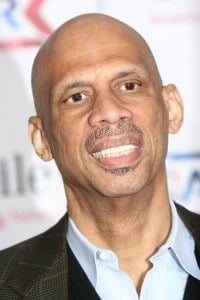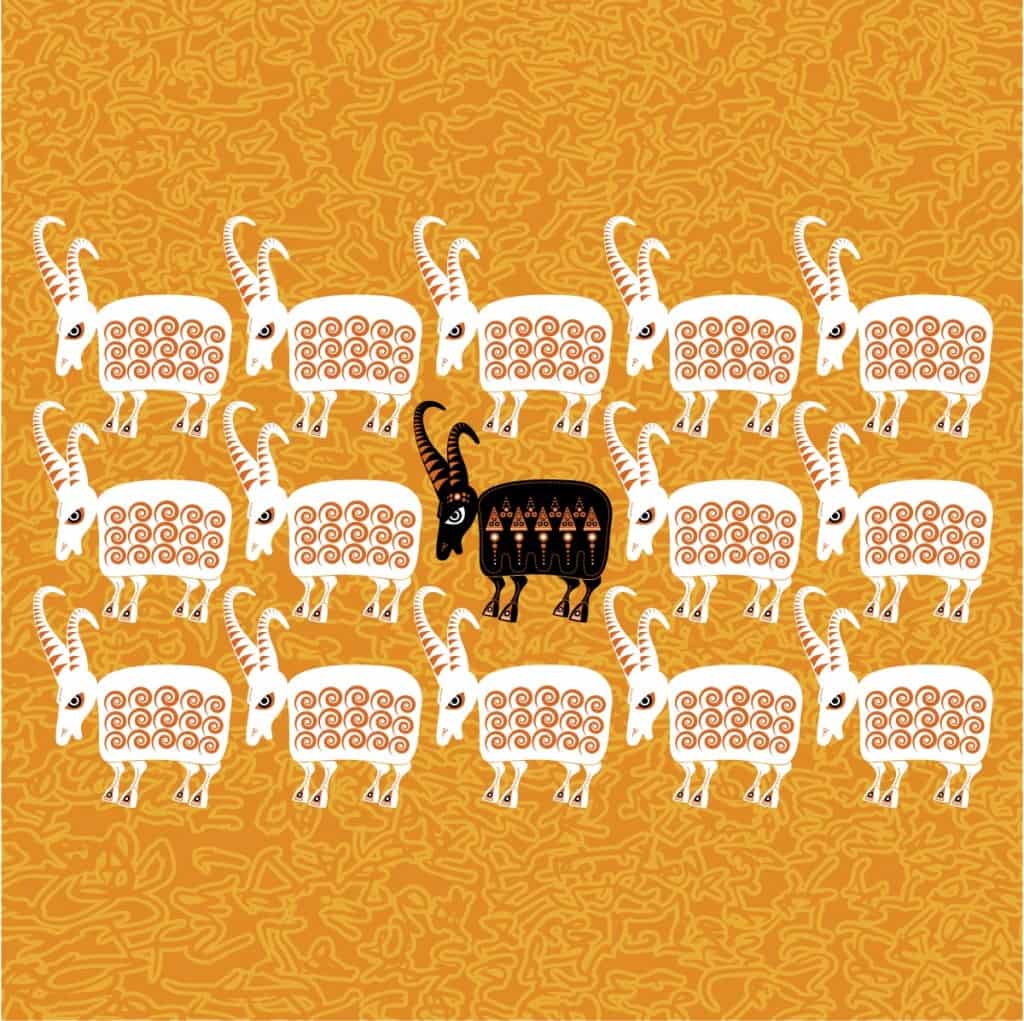Almost six weeks after being recorded making racist and offensive remarks to his girlfriend, Donald Sterling is still in the news. It is, of course, newsworthy that a figure of Sterling’s stature has been publicly exposed as a racist. Combined with the voracious appetite of our 24-hour news cycle, we seem unable to have our fill of this drama. Yet, if Kareem Abdul-Jabbar’s recent observations hit their mark, the steady diet of salacious details is but thin gruel and the true importance of this case continues to be neglected.
In a nutshell, here’s the story: an 80-year old billionaire NBA owner is secretly taped making racist comments to his much younger girlfriend. Sterling’s remarks are made public and frenzy erupts. Outrage spreads like a cold in a kindergarten: the players were outraged, Magic Johnson was outraged, fans and pundits, politicians and organizations, all express outrage at his outlandish commentary. What better feeling than outrage to express our reaction to someone caught saying, and I quote, “…it bothers me a lot that you want to broadcast that you’re associating with black people.”
Six-time Most Valuable Player and NBA legend Kareem Abdul-Jabbar issues a word of caution against allowing our outrage to focus exclusively on Sterling. Certainly Sterling is the villain of this particular story, and Kareem recognizes as much. “But,” he continues, Sterling is “just a handmaiden to the bigger evil. In our quest for social justice, we shouldn’t lose sight that racism is the true enemy.”
We seem to have become so fixated on the outrage we feel at Sterling’s comments that we have lost sight of the scandalous way these comments were provoked and captured, and of the fact that Sterling’s personal racism is only a small part of a systemic issue. I agree with Kareem, and I suspect the French literary theorist and cultural critic René Girard would as well.
René Girard is famous for articulating what he calls the “scapegoat mechanism,” which is this: in moments of social unrest, when chaotic turbulence appears to threaten the fabric of our social order, human societies restore order by directing its fury toward a common enemy. It’s by uniting all-against-one and expelling our enemy that human society restores homeostasis. For Girard, the scapegoat mechanism restores peace to our social order after the offending party has been punished or cast out. This is, however, but an ephemeral peace. For the next time unrest disturbs the community, another victim will have to be found.
One needs to look no further than schoolyard bullying to glimpse this phenomenon. Junior high students – each at some level of terrible awkwardness – frequently and readily gang up against one or another student. One day it may be the boy who smells like tuna, another day against the girl who isn’t wearing the right fashion label. The insecurity of adolescence finds temporary peace as the group coalesces over-and-against the one it expels. By casting out the fat kid, the self-doubt and insecurity that roils beneath the surface of every class abates for a moment as the many become one by expelling one. Enter Donald Sterling.

Kareem / Shutterstock s_bukley
Kareem reflects the societal version of this action in what he calls the “newest popular sport of Extreme Finger Wagging.” On talk shows and call-in radio, in blogs and magazines, haven’t we reconciled ourselves as a society in our communal outrage against Sterling’s racism? We have been gathered, not by a cause we wish to combat, but by collectively pointing fingers at Sterling and condemning not racism, but him. The NBA has expelled him from team ownership and he has become the butt of jokes and social commentary. Media portrayals of this event and its backlash would have us believe that all of this finger wagging is a watershed moment for the NBA, a moment when we finally we resolve never again to tolerate racism. “This time,” we tell ourselves as we watch Sterling’s public flogging, “things will change.”
But will they really? Amidst this media attention, are we really coming to a greater social awareness of the real problem? Has sensational reporting helped to fortify our country against the central issue – which is the reality of systemic racism – or has it merely given us temporary satisfaction?
Let me be clear. It is not that Sterling ought to be absolved here, his comments are intolerable. But there is something more, something that Girard himself saw when he acknowledges, “scapegoats cure neither real epidemics nor droughts nor floods” (The Scapegoat, 43). By publicly exposing Sterling as a racist – one with a well-documented history of racist behavior – is not sufficient to expunge this toxin from out midst. Indeed, our fingers may have become so accustomed to pointing away from ourselves in a gesture of outrage that we have forgotten to consider our own contribution to the problem.
So often we allow ourselves to be fed on a steady diet of quick news bites that leave us feeling informed, but this thin gruel is hardly capable of transforming our collective heart. So what are we to do? If we as a society should desire to do the hard work required of confronting the issue of racism both as it affects us and as we contribute to it – if we should desire to become a community that does not base the social order on scapegoating one another – we would do well to engage in some form of spiritual exercise. Enter Saint Ignatius.
It is one of Saint Ignatius’ central insights to require those making the Spiritual Exercises to meditate on their sinfulness. I’m not talking about sin as metaphorical dark smudges on one’s soul. Rather, I’m talking about the deeply rooted sinfulness that plays itself out by crippling us in our humanity and wreaking havoc on the world. Ignatius wants us to confront both our personal sinfulness and the way our sinfulness affects the world.
We are, all of us, caught up in a personal and communal history of rejecting God’s friendship and forging our identity over-and-against others. And this is not a new thing. The authors of Genesis understood the mechanism of scapegoating when they portrayed Adam as blaming Eve for giving him the fruit of the tree; Caiaphas knew it to be better for one man to die than an entire nation perish. Rather than looking inward for the deep roots of sinfulness, we human beings seem bound to prefer to point fingers, to cast stones; to reconcile ourselves by blaming and expelling others.
Yet, as Christians, we believe that God continues to offer us a chance for conversion. We are offered, again and again, the chance to return to friendship with God. At no point in the Exercises does Ignatius permit us to blame someone else for our misdeeds. Quite to the contrary, the light of grace leads us to point to ourselves and accept responsibility for our sinfulness and the ways we have contributed to so many hurts and ills. Likewise, grace’s light illuminates the path we are called to follow: the path of mercy, walked with the One who is the way, the truth, and the life.
For both Kareem Abdul-Jabaar and René Girard, we only delude ourselves if we think our public outcry against Donald Sterling is sufficient to expunge our racist ways. For them and for us the fact is not that Sterling is innocent. He’s not. It’s that we must resist thinking that our having found in him a scapegoat is sufficient to address the society-wide issue of entrenched racism. It is not. Together as a nation, we need to look deep within ourselves and allow the deep social sin of racism to be brought to light. In this, bullying and racism have similarly deep roots: a fear and insecurity that leads us to act out against others, to label and judge them, rather than allowing them to be who they are.
And who are we? Like Pope Francis said, we are all sinners. We are women and men broken and in need of a savior. As Christians, we believe the healing we need comes not from Oprah or Doctor Phil but from the Crucified One, the Scapegoat who became a victim of our sin. We believe that Jesus Christ, the Lamb of God, has exposed the senselessness of our human violence and, in his friendship, offers us a way to be sisters and brothers in His body.
— — // — —
The cover image is by Flickr user Zennie Abraham and can be found here.



